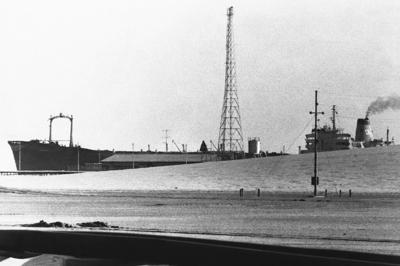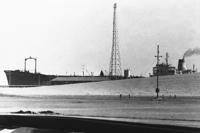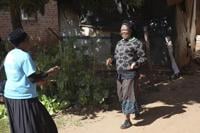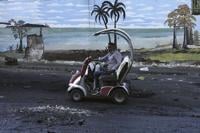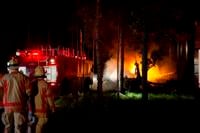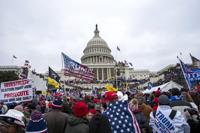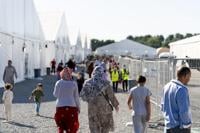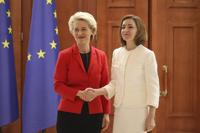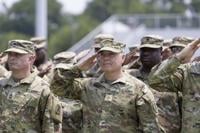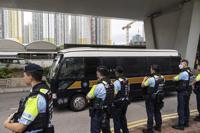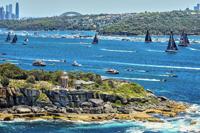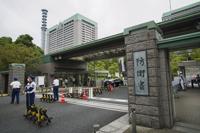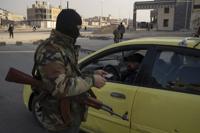DUBAI, United Arab Emirates (AP) — Qatar will be on the world stage like it has never been before as the small, energy-rich nation hosts the 2022 FIFA World Cup later this month.
The country, on a thumb-shaped peninsula that juts out into the Persian Gulf, has seen its international profile rise as Doha used its massive offshore natural gas fields to make its nation one of the world's richest per-capita.
It has used that money to host the tournament, as well as build out the Arab world's most-recognized satellite news channel, Al Jazeera, construct a major military base that hosts U.S. troops and become a trusted interlocutor for the West — even with the Taliban.
Here's more to know about Qatar ahead of the World Cup.
QATAR'S PLACE IN THE WORLD
Qatar, pronounced like saying the word “cutter” with a soft “r,” sits on the Arabian Peninsula and shares a land border with Saudi Arabia. It's also near the island nation of Bahrain, as well as the United Arab Emirates, home to Abu Dhabi and Dubai. It sits across the Persian Gulf from Iran and shares its massive offshore natural gas field with it. Qatar is about twice the size of the U.S. state of Delaware. The majority of its 2.9 million people live around its capital, Doha, on its east coast. Qatar is a primarily flat, desert country, where temperatures in the summer go above 40 degrees Celsius (104 degrees Fahrenheit) with high humidity.
GOVERNANCE IN QATAR
Qatar is an autocratic nation overseen by its ruling emir, Sheikh Tamim bin Hamad Al Thani. Sheikh Tamim, 42, took power in June 2013 when his father stepped down. The emir wields absolute power in the country, though a 45-seat council does offer advice. As in other Gulf Arab nations, political parties are banned. The right to form unions and strike remains extremely limited. There are no independent human rights organizations operating in the country. Only some 10% of its population are citizens who enjoy vast cradle-to-grave government benefits. Naturalization is rare.
QATAR'S HISTORY
The Al Thani family has ruled Qatar since 1847, though it was first under the Ottoman and then the British empire. Qatar became an independent nation in 1971 as the British left the region. Oil exports began after World War II, though it would take until 1997 before Qatar began shipping out liquified natural gas to the world. That new money powered Qatar's regional ambitions. It founded the satellite news network Al Jazeera, which brought an Arab perspective to mass media that helped fuel the 2011 Arab Spring protests. It also launched Qatar Airways, a major airline for East-West travel.
QATAR'S INTERNATIONAL POLITICS
Qatar follows an ultraconservative form of Sunni Islam known as Wahhabism, though unlike neighboring Saudi Arabia, foreigners can drink alcohol. Its faith informs its politics. Qatar backed Islamists in the 2011 Arab Spring, including Egypt's Muslim Brotherhood and former Egyptian President Mohammed Morsi, as well as those who rose up against Syria President Bashar Assad. Al Jazeera became famous for running statements from al-Qaida leader Osama bin Laden. Qatar has also served as an intermediary for the militant group Hamas, as well as host of the negotiations between the United States and the Taliban that led to America's 2021 withdraw from Afghanistan. Its support of Islamists, in part, led to a yearslong boycott of the country by Bahrain, Egypt, Saudi Arabia and the UAE . That boycott only ended as President Joe Biden prepared to enter the White House.
QATAR'S MILITARY IMPORTANCE
After allowing Western troops to be based in Qatar during the 1991 Gulf War, the country built its massive Al Udeid Air Base for over $1 billion. American troops began secretly using the base after the Sept. 11, 2001 terror attacks and the subsequent invasion of Afghanistan. Use of the base became public knowledge during a Mideast trip by then-Vice President Dick Cheney in March 2002, though sensitivity about the American presence there continued for years. America then moved the forward headquarters of the U.S. military's Central Command to Al Udeid in 2003 an ran air operations in Afghanistan, Iraq and Syria, including during the rise of the Islamic State group and the evacuation of Kabul in 2021. It hosts some 8,000 U.S. troops today. Turkey also maintains a military base in Qatar.
___
Follow Jon Gambrell on Twitter at .

